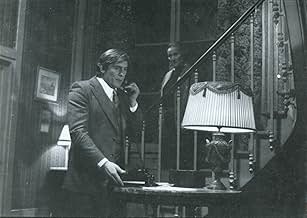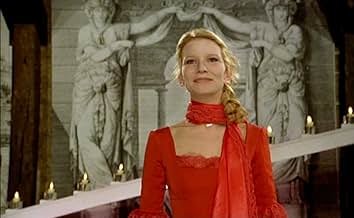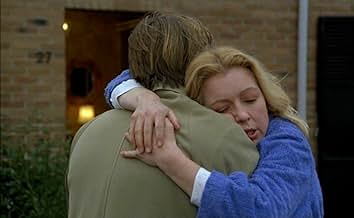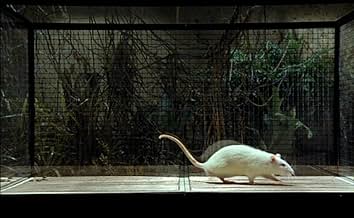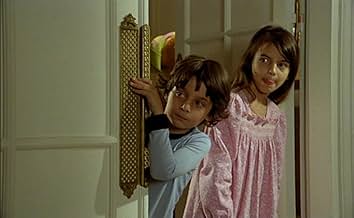CALIFICACIÓN DE IMDb
7.6/10
7.2 k
TU CALIFICACIÓN
Un hombre de negocios, un escritor y una aspirante a actriz son utilizados como ejemplos por el profesor Henri Laborit para ilustrar sus teorías sobre el comportamiento.Un hombre de negocios, un escritor y una aspirante a actriz son utilizados como ejemplos por el profesor Henri Laborit para ilustrar sus teorías sobre el comportamiento.Un hombre de negocios, un escritor y una aspirante a actriz son utilizados como ejemplos por el profesor Henri Laborit para ilustrar sus teorías sobre el comportamiento.
- Dirección
- Guionistas
- Elenco
- Nominado a 1 premio Óscar
- 11 premios ganados y 12 nominaciones en total
Maurice Gautier
- Le père de René
- (as Maurice Gauthier)
- Dirección
- Guionistas
- Todo el elenco y el equipo
- Producción, taquilla y más en IMDbPro
Opiniones destacadas
Based on the writings of French physician/philosopher Henri Laborit: the lives of three individuals are chronicled and analyzed using theories of how human lives and behaviours are formed and the results of inner and outer conflicts due to early programming. The individuals are René (Gérard Depardieu), a devout Catholic who left behind his farming family and became an executive in a textile factory; Janine (Nicole Garcia) whose family cut ties with her when she pursued a successful career in acting; and Jean (Roger Pierre) who was born into wealth and works in politics and writing.
It is clear at the beginning that this film is unconventional. The opening sequence has three simultaneous narrations of the early lives of the main characters and it takes a very long time - much longer than most narrations take. But it all pays off. The information is valuable for the fascinating stories of what happens to the characters later on.
The acting of the three leads is solid. Among some of the best scenes: Depardieu and Pierre each have at least one hissy fit moment in which they are hilarious, chewing up the scenery and everyone else in it.
The Depardieu story is particularly fascinating as it accurately displays the unethical viciousness of the corporate world. (Notice the film takes place in 1980, a decade in which corporate deviousness would begin to take over the world and worsen with each decade that followed.) The René story can resonate with anyone who has spent any time in corporate purgatory.
The frequent narration of the film is intriguing in its observations of human behaviour using three fine examples. The style of the film is experimental. Usually, this means disaster but in the case of "Mon Oncle d'Amérique", the experimental style not only works; it works quite well. - dbamateurcritic
RATING: 9 out of 10
OUTSTANDING ACHIEVEMENT: Screenplay by Jean Gruault.
It is clear at the beginning that this film is unconventional. The opening sequence has three simultaneous narrations of the early lives of the main characters and it takes a very long time - much longer than most narrations take. But it all pays off. The information is valuable for the fascinating stories of what happens to the characters later on.
The acting of the three leads is solid. Among some of the best scenes: Depardieu and Pierre each have at least one hissy fit moment in which they are hilarious, chewing up the scenery and everyone else in it.
The Depardieu story is particularly fascinating as it accurately displays the unethical viciousness of the corporate world. (Notice the film takes place in 1980, a decade in which corporate deviousness would begin to take over the world and worsen with each decade that followed.) The René story can resonate with anyone who has spent any time in corporate purgatory.
The frequent narration of the film is intriguing in its observations of human behaviour using three fine examples. The style of the film is experimental. Usually, this means disaster but in the case of "Mon Oncle d'Amérique", the experimental style not only works; it works quite well. - dbamateurcritic
RATING: 9 out of 10
OUTSTANDING ACHIEVEMENT: Screenplay by Jean Gruault.
Professor Henri Laborit is one of the geniuses of the previous century. And Alain Resnais directed a movie faithful to the scientist's work.
We could say about Mon oncle d'Amérique that it's a totally original film. It's impossible to compare it to any of the other movies in the history.
This piece of art shows in a very elegant and clever way how we human beings behave. It's as brilliant as deeply moving.
Definitely a must-see that reminds us why we used to admire Gérard Depardieu. The use of the archive footage of Danielle Darrieux, Jean Gabin, and Jean Marais are very touching in the middle of a movie that seems to be cold and demonstrative but that is not.
Watch this masterpiece ASAP. You'll never regret it.
We could say about Mon oncle d'Amérique that it's a totally original film. It's impossible to compare it to any of the other movies in the history.
This piece of art shows in a very elegant and clever way how we human beings behave. It's as brilliant as deeply moving.
Definitely a must-see that reminds us why we used to admire Gérard Depardieu. The use of the archive footage of Danielle Darrieux, Jean Gabin, and Jean Marais are very touching in the middle of a movie that seems to be cold and demonstrative but that is not.
Watch this masterpiece ASAP. You'll never regret it.
I just saw this - after having heard of it, seen it on video store shelves for over a decade. A movie that begins oddly, drily, repays anyone who pays attention for at least 15 minutes with something absorbing, warm, fascinating and often quite funny.
It is one of the most thought-provoking movies I've ever seen in my life. I disagree that its appeal is limited to intellectuals or those who like the director (I'd seen only Last Year at Marienbad, couldn't tell hide nor tail, and that was all I thought of Resnais).
Depardieu's character is one we can relate to fully as much as we do to Willy Loman in Death of a Salesman - but all the principal characters (except the cold as ice boss of Depardieu) are greatly sympathetic.
This is just so moving and powerful a movie about the life we life - our work, our anger, our sorrow, our obsession, our ambition, our ideals and the way we deal with the things we want in life. Just stay with it for 15-20 minutes - you'll be fascinated. This is truly superb, truly absorbing, truly unique.
It is one of the most thought-provoking movies I've ever seen in my life. I disagree that its appeal is limited to intellectuals or those who like the director (I'd seen only Last Year at Marienbad, couldn't tell hide nor tail, and that was all I thought of Resnais).
Depardieu's character is one we can relate to fully as much as we do to Willy Loman in Death of a Salesman - but all the principal characters (except the cold as ice boss of Depardieu) are greatly sympathetic.
This is just so moving and powerful a movie about the life we life - our work, our anger, our sorrow, our obsession, our ambition, our ideals and the way we deal with the things we want in life. Just stay with it for 15-20 minutes - you'll be fascinated. This is truly superb, truly absorbing, truly unique.
Usually with films we supply our own model of viewing, what values and parameters we accept to matter. Here the model is built in the film itself. It's an epistemological vision of human behavior patterns, guided by a behavioral biologist. We are provided with a set of criteria that govern our actions, fight or flight, actions taken to prolong pleasurable sensations or to avoid their opposite, and based upon the scientist's research, Resnais creates scenarios to exemplify them. Theory in practice, more or less.
This is the first handicup of the film for me. Resnais's consistent mark of genius has been his ability to visualize the mind as a threedimensional space, where by characters who act as our proxies into this world of the mind we can wander that space in an effort to discern the mechanisms that sustain it. How the forms we later experience as real come into being, illusionary. His vision is poignant for me precisely because it is translated as cinema, which as a blank canvas where upon it various flickering narratives are projected, is an ideal replica of the mind. He gave us Hiroshima and Marienbad, which is more than most directors contributed to the medium.
But Resnais always approached his subject as a poet, with capacity for awe and mystery, whereas now his vision feels constricted to fit criteria and structures.
Nonetheless the film does well to present us with situations we may know from life. An illicit thryst, frustrations at work, various ambitions for love or power thwarted, the outcomes of these don't matter. We're meant to identify the roots of suffering, how it arises in the form of sensation within the matrix that we experience as reality.
So far the film is wise, in showing us to be lab rats trapped in a glass panel box which is intermittently electrocuted by unseen devices. Perhaps we come to understand by this how suffering is an inate response to life in the cage, therefore inescapable. And how the devices that produce our suffering are invisible to us from inside the cage. Even more importantly, how our various attempts to imprint meaning on the objects of our world, by naming them or pretending to arrange them into patterns or hierarchies, are merely masks we have devised to conceal simple impulses and desires. To be safe or sated, or to avoid pain.
But the film is cautiously scientific, and will not venture further. The above important realization is mute for me without the spiritual. It is a dry understanding of fascinating stuff.
None of which is very subtle anyway. We're lectured a bit. We actually revisit excerpts of earlier scenes so we can identify specific reactions as narrated to us by the scientist. The lab rat metaphor couldn't beat us around the head more, if we actually saw the actors with the head of a rat reenact an angry exit. Wait, we do! But none of this bothers me overmuch. What bothers me is the pessimism.
Which is to say that having understood all this, the mechanisms that control the apparent reality we experience as our everyday routine, we are in position to transcend them. Our bodies may remain in the cage, yet having understood all this, how various forms of ego and desire blind us, our consciousness is already out of it. A glimpse out of the box is possible. Or as the film says, understanding the laws of gravity does not mean we escape them but we can get to the moon.
This is of course a fundamental attribute of how we are not like animals. We are not even animals with the unique ability to remember and form connections between the objects of memory. We are spirited beings. The film, conservative as issued under the credence or pretence of science, does not dare to articulate as much.
But then we have the final image, which says more than most films ever did. It's something I'll want to keep inside of me.
We see the mural of a tree painted on the brick wall of a building. From a distance, it looks beautiful, perhaps the real thing. But once up close, we see the beautiful, harmonious shape for what it is. Bricks as particles, a structure ugly, functional, nondescript, bearing no resemblance to the overall shape.
Two levels of reality then, apparent and ultimate. Order, shape, meaning from afar. Distinctions between brick and tree, as created in the eye. But once inside we understand the emptiness, the sameness of everything. How the above attributes are illusionary, imprints of the eye upon the wall. Will this image terrify or soothe you?
Perhaps the film understands more than it lets out from its cautious application of science. This is one of the 5 best metaphors in the history of cinema. It's so good, it's worthy of being in Blowup.
This is the first handicup of the film for me. Resnais's consistent mark of genius has been his ability to visualize the mind as a threedimensional space, where by characters who act as our proxies into this world of the mind we can wander that space in an effort to discern the mechanisms that sustain it. How the forms we later experience as real come into being, illusionary. His vision is poignant for me precisely because it is translated as cinema, which as a blank canvas where upon it various flickering narratives are projected, is an ideal replica of the mind. He gave us Hiroshima and Marienbad, which is more than most directors contributed to the medium.
But Resnais always approached his subject as a poet, with capacity for awe and mystery, whereas now his vision feels constricted to fit criteria and structures.
Nonetheless the film does well to present us with situations we may know from life. An illicit thryst, frustrations at work, various ambitions for love or power thwarted, the outcomes of these don't matter. We're meant to identify the roots of suffering, how it arises in the form of sensation within the matrix that we experience as reality.
So far the film is wise, in showing us to be lab rats trapped in a glass panel box which is intermittently electrocuted by unseen devices. Perhaps we come to understand by this how suffering is an inate response to life in the cage, therefore inescapable. And how the devices that produce our suffering are invisible to us from inside the cage. Even more importantly, how our various attempts to imprint meaning on the objects of our world, by naming them or pretending to arrange them into patterns or hierarchies, are merely masks we have devised to conceal simple impulses and desires. To be safe or sated, or to avoid pain.
But the film is cautiously scientific, and will not venture further. The above important realization is mute for me without the spiritual. It is a dry understanding of fascinating stuff.
None of which is very subtle anyway. We're lectured a bit. We actually revisit excerpts of earlier scenes so we can identify specific reactions as narrated to us by the scientist. The lab rat metaphor couldn't beat us around the head more, if we actually saw the actors with the head of a rat reenact an angry exit. Wait, we do! But none of this bothers me overmuch. What bothers me is the pessimism.
Which is to say that having understood all this, the mechanisms that control the apparent reality we experience as our everyday routine, we are in position to transcend them. Our bodies may remain in the cage, yet having understood all this, how various forms of ego and desire blind us, our consciousness is already out of it. A glimpse out of the box is possible. Or as the film says, understanding the laws of gravity does not mean we escape them but we can get to the moon.
This is of course a fundamental attribute of how we are not like animals. We are not even animals with the unique ability to remember and form connections between the objects of memory. We are spirited beings. The film, conservative as issued under the credence or pretence of science, does not dare to articulate as much.
But then we have the final image, which says more than most films ever did. It's something I'll want to keep inside of me.
We see the mural of a tree painted on the brick wall of a building. From a distance, it looks beautiful, perhaps the real thing. But once up close, we see the beautiful, harmonious shape for what it is. Bricks as particles, a structure ugly, functional, nondescript, bearing no resemblance to the overall shape.
Two levels of reality then, apparent and ultimate. Order, shape, meaning from afar. Distinctions between brick and tree, as created in the eye. But once inside we understand the emptiness, the sameness of everything. How the above attributes are illusionary, imprints of the eye upon the wall. Will this image terrify or soothe you?
Perhaps the film understands more than it lets out from its cautious application of science. This is one of the 5 best metaphors in the history of cinema. It's so good, it's worthy of being in Blowup.
This film will only appeal to two types of people 1. Resnais die-hard fans (including me) and intellectuals. This film is extremely odd and infuriating if your an average cinema goer. The film is a cinematic science lesson. But it is absolutley amazing. Resnais uses documentary techniques and surrealism and a narrator (a world renowned expert on human behaviour) who discusses the characters through out the film. It follows three people who are all loosely connected. What makes the film so superb is the fact that it is am intellectual avante garde arthouse film, that instead of isolating the viewer like they usually do. Resnais creates a wonderfully warm film. You end up really liking the characters. Who grow up before your eyes over the years. Resnais doesn't put a foot wrong.Gerard Depiedieu is great as the frustrated office worker who struggles raising a family and hassles at work.
ten out of ten
ten out of ten
¿Sabías que…?
- TriviaThere are several scenes from films featuring Danielle Darrieux, Jean Marais and Jean Gabin used in this film.
- Citas
Henri Laborit: [First lines] A being's only reason for being is being. In other words, to maintain its organic structure. It must stay alive. Otherwise, there is no being.
- ConexionesEdited from La belle équipe (1936)
Selecciones populares
Inicia sesión para calificar y agrega a la lista de videos para obtener recomendaciones personalizadas
- How long is My American Uncle?Con tecnología de Alexa
Detalles
Taquilla
- Total a nivel mundial
- USD 38,465
- Tiempo de ejecución2 horas 5 minutos
- Mezcla de sonido
- Relación de aspecto
- 1.66 : 1
Contribuir a esta página
Sugiere una edición o agrega el contenido que falta

Principales brechas de datos
By what name was Mi tío de América (1980) officially released in India in English?
Responda
![Ver Bande-annonce [OV]](https://m.media-amazon.com/images/M/MV5BYWEzZjZmODAtMjgzNS00NTYzLTgyZDctZTFhYWE4OTE3NTFkXkEyXkFqcGdeQXRyYW5zY29kZS13b3JrZmxvdw@@._V1_QL75_UX500_CR0)
